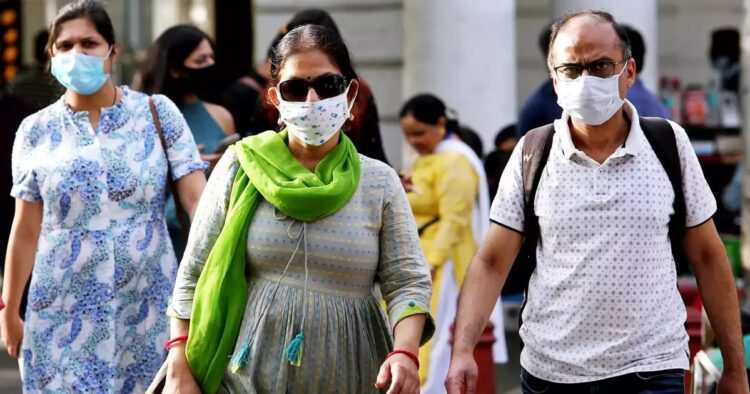Bharat is facing a new challenge as the Covid JN.1 variant, a sub-variant of Omicron, has entered the country, causing concern among health authorities. With over 150 reported cases, the variant is raising alarm bells, prompting a call for the reinstatement of social distancing measures, especially during the New Year celebrations. The new strain is known for its higher transmissibility rate compared to previous variants, making preventive measures crucial to curb its spread.
Experts, including Dr. Pavithra Venkatagopalan, a microbiologist, highlight that JN.1 has evolved through genetic changes from the Omicron variant. It exhibits a significantly higher transmissibility rate, suggesting that even minimal exposure could lead to infection. The winter season, combined with festive gatherings, increases the risk of transmission, as the virus can linger in the air for longer periods. Common symptoms of JN.1 include fever, cough, cold, headache, gastrointestinal issues, and breathing difficulties, posing a higher risk to individuals with co-morbidities or previous lung damage.
Dr. Tanu Singhal emphasizes that JN.1 spreads faster than other Omicron lineages but does not necessarily cause more severe disease. It has become a dominant variant globally, causing a substantial percentage of SARS-COV infections. While it has been labeled a Variant of Interest by the WHO, studies suggest that Omicron-specific vaccine boosters may offer some cross-protection against JN.1. Fortunately, cases associated with this variant have shown mild symptoms, with no significant increase in hospitalizations compared to other Omicron strains.
Dr. Nikhil Modi, from Indraprastha Apollo Hospitals, notes that the genetic differences in the JN.1 variant contribute to its faster spread. Presently, most cases involve mild symptoms such as headaches, cough, runny nose, sore throat, body aches, and fever. As the number of cases increases, the potential for more severe cases also rises. The severity may depend on underlying health conditions, emphasizing the importance of monitoring symptoms, especially for those with pre-existing health issues.
Dr. Avi Kumar warns that JN.1, while sharing traits with prior Omicron strains, exhibits notable symptoms that individuals should be aware of. Fever, runny nose, sore throat, headache, and moderate gastrointestinal issues are some of the key symptoms. However, there is no evidence suggesting increased severity or higher fatality rates compared to other variants. Individuals with compromised health, such as lung scarring from previous infections, should take extra precautions.
Experts unanimously agree on the importance of preventive measures. Dr. Pavithra highlights that JN.1 presents usual symptoms like fever, fatigue, and body ache, along with mild gastrointestinal symptoms. Vaccination and boosters remain effective in protecting against the variant. While there’s no need for immediate panic, vigilance and adherence to precautions, including regular handwashing and mask-wearing, are crucial to curb the spread of the new variant.
In conclusion, Prof. Dr. Rahul Pandit emphasizes the need for vigilance, especially during the holiday season. He encourages individuals with high-risk factors to wear masks in crowded and confined spaces. The key message is to enjoy the holiday season with caution, practicing self-awareness and responsible behavior to ensure the safety of everyone amid the emergence of the JN.1 variant.
















Comments